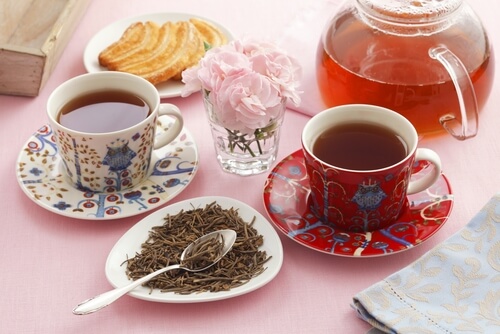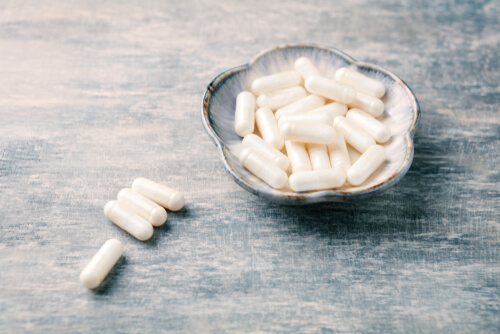Insomnia is a widespread problem in the general population. The prevalence of the condition is estimated to be around 33%, but the same paper advises some worldwide studies have suggested the incidence might be much higher. It leads many to search for the best natural sleeping aids to fall asleep faster and improve their overall sleep quality. While drugs are available to assist with improving sleep, herbal sleeping pills are often preferred due to the lower risk of abuse and side-effects. This post looks at several natural sleeping aids and how they work to assist individuals with insomnia to improve their sleep.
Learn About Sleeping Pills:
How Natural Sleeping Aids Work
Various sleeping aid pills and drugs are available on the market today. It is possible to obtain a prescription for sleeping disorders, but due to the side-effects associated with these drugs, many people are instead opting for natural sleep medication.
These products are often made from sleeping aid herbs or specific minerals and vitamins. Each option works differently to help reduce anxiety and bring about calmness to the person taking the product. A number of these products tend to alter certain neurotransmitters or hormones which may help to make a person feel calm, which would ultimately lead to improved sleep. There are also sleeping aid vitamins and minerals which assist in improving hormone and neurotransmitter production, providing a natural improvement in the balance of these substances. In turn, it may help in reducing stress and anxiety, and make a person sleep better.
Note that natural does not necessarily mean safe. The supplements, herbs, and foods listed below still have some side effects, interactions, and may also cause allergic reactions. Do not replace the treatment prescribed by doctor with any other natural or synthetic alternative without prior consultation with a healthcare provider.
Natural Sleeping Aid Substances
While many supplements are available today claims to help improving sleeping, it is essential to note they are not all equally effective. Whether looking for a tea sleeping aid or perhaps a pill, it is crucial to consider the active compounds found in these products. Below is an overview of some sleeping aid herbal ingredients which may hold potential in reducing the effects of insomnia. Some of these may also be appropriate for individuals looking to get their hands on a sleeping aid for kids.
Melatonin
Melatonin is a natural hormone that is already present in the human body.
As nightfall comes closer, the production of the hormone starts to increase. This hormone assists with the synchronization of various oscillators in the human body, which ultimately helps to keep the circadian rhythm in balance. Supplements containing the hormone increase levels of melatonin at the appropriate time, which might make a person feel tired and fall asleep faster.
Valerian Root
Valerian is a type of herb. It possesses several medicinal properties. The root of the plant is utilized to produce natural medicine that is often used to assist in the treatment of certain sleep disorders. This includes insomnia, which is why valerian sleeping pills have become a popular option on the market today. A valerian sleeping aid might also assist with reducing anxiety, as well as stress, which could further improve sleep. The plant acts on the nervous system, as well as the brain, as a type of sedative.
Magnesium
Magnesium is a naturally-occurring mineral that has various functions in the human body. The intake of magnesium supplements has been found to provide effective results in women who frequently experience signs of insomnia.
Daytime sleepiness was also reduced with the consumption of magnesium.
The same results were not found among men, however, which is vital to be noted here. This nature made sleeping aid is readily available in supplement form. When it comes to looking for sleeping pills natural offerings, this is often one of the active ingredients.
Passion Flower
There are different plant species categorized as passionflower. These plants are known to have several beneficial properties. Many people use passionflower to assist in reducing symptoms associated with anxiety, which makes it a potential natural sleeping aid. The extracts of the flower may provide a calming effect. This can also be useful for those who experience insomnia at night. In addition to these uses, passionflower is often also used to treat liver-related problems, earaches, and even to help wounds heal faster.
Glycine
Glycine is one of the many amino acids which form part of the body and is sometimes also added to all-natural sleeping pills. The amino acid is crucial for the production of proteins, enzymes, and certain hormones. While the body does produce some glycine on its own, taking the amino acid in the form of a supplement could provide additional benefits. The use of glycine at night, before going to bed, may help to reduce the core temperature of the body. It is known that warmer body temperature can lead to sleeping difficulties. Thus, this particular effect of glycine may help to make a person fall asleep faster. It could also potentially reduce the risk of a person waking up frequently at night.
Ginkgo Biloba
Ginkgo Biloba is an herb, often advised for improving cognitive function. Recently, this product has also become one of the more popular nature made sleeping pills. The natural chemicals in this plant extract are known to cross the blood-brain barrier, yielding effective results in improving alertness and focus, as well as possibly memory function as well.
When this supplement is taken before going to bed, it may also induce a state of relaxation. Furthermore, Ginkgo Biloba might be able to aid in reducing stress.
These effects may assist in improving sleep when psychological factors like anxiety and stress cause insomnia.
Chamomile Tea
One of the best teas for sleeping aid is chamomile tea. This tea is often recommended for both adults and children, as it can calm the mind and body. The natural compounds that are found in chamomile plants could also reduce the effects of anxiety on the mind, which means those individuals who lay awake at night due to these symptoms might be able to benefit from a tea infused with this flower extract. In addition to possibly being able to help reduce the effects of insomnia and reduce sleeping disruptions, the natural chemicals found in chamomile may also help to reduce active inflammation in the body. The plant also contains an antioxidant known as apigenin, which can assist in fighting against free radical damage in the body. This one is often thought of like a homemade sleeping drug, as the tea is readily available in stores and can be easily made at home. Since the drink is made from natural ingredients, it is considered very safe.
St. John’s Wort
The most popular use for St. John’s Wort is to assist in reducing the symptoms generally associated with depression. While this natural plant-based extract has been shown to provide an effective alleviation of depression-related symptoms, it should be noted that supplements containing St. John’s Wort may have other benefits as well. Some people use the product to improve sleep due to its ability to reduce anxiety and stress potentially. Many people who use St. John’s Wort as a way of enhancing sleep also tend to experience an increase in energy and a reduction in fatigue during the day.
Note that St. John’s Wort adversely interacts with a huge variety of drugs and substances. Make sure to investigate the topic and consult with a healthcare provider before using this herb.
Natural Sleeping Aids Foods
Apart from supplements that contain the herbal sleeping aids described in the previous section, it is essential to note that some foods can be consumed to reduce the effects of insomnia possibly. Below is an overview of foods that can act as homemade sleeping aids for people with insomnia. This can be very useful for those looking to avoid buying sleeping pills over the counter.
Cherries
There are very few foods that contain melatonin, a natural hormone that helps to keep the sleep-wake cycles of the body in check. Cherries would be one of these few foods. In particular, it is the tart cherries that contain melatonin. In addition to the melatonin content, it has also been found that another type of natural compound found in tart cherries, known as anthocyanins, could further promote improvements in sleep.
Cheese
This one might come as somewhat of a surprise, but cheese is another food that could potentially help a person sleep better.
The reason why cheese could be beneficial for improving sleep is due to the tryptophan content. Tryptophan is a type of amino acid that is often advised for reducing stress.
With stress being such a common cause of insomnia, the reduction of anxiety may help a person fall asleep without tossing and turning for hours on end. This improves the ability to be calm at night for a person who struggles with sleeping. Tryptophan, a natural compound in cheese, may also have a direct effect on inducing sleep. Thus, a person should consider cheese if they are searching for information about sleeping aids home remedies.
Salmon
Salmon is considered to be an exceptionally healthy type of food and may be a great addition to the diet of a person who has trouble sleeping. This makes salmon an ideal option when it comes to looking for homemade sleeping aids. This fish is filled with natural omega-3 fatty acids, which has profound benefits for the brain, heart, and many other parts of the body. Additionally, eating salmon could also potentially help to improve sleep. The reason behind this would be the vitamin B6 content that is found in the fish. Vitamin B6 has several roles to play. People who have sleeping problems may find that this natural nutrient can help to improve the balance of hormones that plays a role in sleep.
Bananas
Stiff and tense muscles cause pain symptoms, and this can lead to poor sleep. Bananas are rich in magnesium, as well as potassium. These minerals are known to be beneficial for tense muscles, as they can act as natural relaxants. When muscles relax, a person feels more calm and less pain. This, in turn, could help the person sleep better.
Low-Fat Milk
Another great food option to consider is a glass of low-fat milk. Low-fat milk is low in calories, yet high in protein, as well as other nutrients. Many of these nutrients can have a calming effect when the glass of milk is consumed just before going to bed. A lot of people find that warming the milk first also to boost the results. Low-fat milk can also be used to make a delicious homemade sleeping aid.
Alternative Sleeping Problems Treatment
Apart from all-natural sleeping pills that could potentially help a person sleep better, certain strategies can help with improving sleep. Below is an overview of alternative options for sleeping aids home remedies.
Cognitive Therapy
Cognitive-behavioral therapy has become a relatively popular treatment for people who do not wish to take sleeping pills but would like to address their insomnia.
This therapy helps the person identify specific behaviors, as well as thoughts, that are causing insomnia.
The treatment then focuses on helping the person change these thoughts and actions.
Physical Activity
Some types of exercises and physical activities could also be beneficial for sleep. It has been found that a few minutes of cardiovascular and aerobic exercises regularly could help to produce an improvement in symptoms of insomnia. Yoga is another type of physical activity – some poses may help to reduce tension and stress before going to bed.
Changing The Before Bed Routine
Identifying specific factors that are having an impact on a person’s sleep can also be beneficial. Spending hours on a smartphone before trying to sleep, for example, has been linked to insomnia. Sticking to a sleep schedule can also be helpful, as well as setting up a ritual to help a person relax before they get into bed.
Why Natural Sleep Medicine May Be The More Appropriate Choice
The side effects of sleeping pills can be harmful. This makes a natural sleeping pill a more appropriate option for people who have insomnia. Drugs that are used to aid in treating insomnia have been associated with possible addictive behavior in patients. When a person abuses such a drug, they might require a medically assisted detox program to help the individual get off the medication without severe withdrawal symptoms. People who rely on sleeping pills too much can start to suffer from more severe insomnia if they cannot get their hands on these drugs.
Different drug addiction treatment methods may then be required to assist in dealing with the abusive behavior that the person has developed. This, in turn, may require the individual to attend one of the top-rated addiction treatment centers, which could incur a lot of medical expenses.
Page Sources
- Swapna Bhaskar, D. Hemavathy, Shankar Prasad. Prevalence of chronic insomnia in adult patients and its correlation with medical comorbidities. J Family Med Prim Care. 2016 Oct-Dec; 5(4): 780–784. https://www.ncbi.nlm.nih.gov/pmc/articles/PMC5353813/
- Sylvie Tordjman, Sylvie Chokron, Richard Delorme, Annaëlle Charrier, Eric Bellissant, Nemat Jaafari, Claire Fougerou. Melatonin: Pharmacology, Functions and Therapeutic Benefits. Curr Neuropharmacol. 2017 Apr; 15(3): 434–443. https://www.ncbi.nlm.nih.gov/pmc/articles/PMC5405617/
- Yingting Cao, Shiqi Zhen, Anne W. Taylor, Sarah Appleton, Evan Atlantis, and Zumin Shi. Magnesium Intake and Sleep Disorder Symptoms: Findings from the Jiangsu Nutrition Study of Chinese Adults at Five-Year Follow-Up. Nutrients. 2018 Oct; 10(10): 1354. https://www.ncbi.nlm.nih.gov/pmc/articles/PMC6212970/

 Authored by
Authored by  Reviewed by
Reviewed by 




